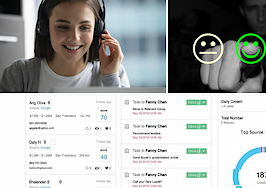Are you receiving Inman’s Agent Edge? Make sure you’re subscribed here for the latest on real estate technology from Inman’s expert Craig Rowe.
Adfenix is making its way into the U.S. real estate market.
The Sweden-based digital advertising automation company was founded in 2014 and quickly found its way into the marketing budgets of top brokerages in the United Kingdom, the Nordics and major markets Down Under. Its focus is on the enterprise, meaning it’s best suited to be a part of large operations. It shoots for clients with at least 11,500 annual sides.
More a service than a marketing product, Adfenix works closely with its clients to map out an outreach strategy and deploy online ads to push traffic to websites, earn organic responses to listing ads and create a centralized marketing resource.
The company is helping a number of notable stateside independent brokerages differentiate themselves, including Berkshire Hathaway Fox & Roach, Corcoran, Warburg, Intero and a number of other companies under LeadingRE.
Through creative ad copy, calls to action, connected landing pages and innovative campaign strategies, Adfenix bills its services on being able to pull in higher quality leads, which is what strategic, prolonged marketing is supposed to do. Relationships should be closer to established before official collaboration happens.
Marketing, after all, should support sales. However, the small budgets that saddle so many agents often prevents them from having solid marketing messages under their feet. This is often why good leads are hard to land for new and growing agents. It’s harder to sell without strategy and good creative leading the way. As result, agents turn to paid leads, a way to buy business from entities that have done the marketing for them.
The team behind Adfenix recognizes that U.S.-based portals are controlling the real estate consumer experience — and it wants to help its clients regain control. From home search to showing to selling, big, third-party companies own the majority of the buying and selling market.
Sweden’s primary property portal has historically cooperated with its data providers, sending lead data directly back to the listing agent in exchange for a fee to be advertised. The relationship is easy to understand for agents and home shoppers.
That’s not the case here.
Adfenix sees so much opportunity in the states because the conduit between listing data and consumer remains noticeably twisted. Far too many parties in the portal model have access to the consumer and their information, in turn blurring the message and stunting the relationship.
The company builds unique customer profiles for each lead that enters the ecosystem, using its technology to gauge their quality, taking into account what homes they’ve viewed, when, and in what environment, such as mobile or desktop. They plug in blogs read and other available data points from any direct website interaction history. That information is then funneled into the audience makeup for ad campaigns, segmented by those who have visited the brokerage’s website and those who haven’t — yet.
Adfenix relies heavily on its partners’ website to be the catch-all destination for prospects, meaning a website needs to be up-to-date, technically proficient and modern in look and functionality, something the industry struggles greatly with achieving. (The company’s list of U.S.-based clients may be somewhat shorter as a result.)
Brokerage staff, such as marketing directors or admins, likely serve as Adfenix’s internal champion, ensuring agents are up to speed with what campaigns are running and how they’ll be billed, as Adfenix’s software can help segment who owes what by agent. It’s ultimately easier for brokerages to pay directly and sort it out at closing.
Campaign activity can be easily monitored via dashboard per property, broken down by typical metrics such as click-through, ad type, ad location, click frequency and search engine used, among other measurables.
Adfenix is hoping to use its success to push the industry away from the idea of relationship management and into data management. From its perspective, a Customer Data Platform (CDP) will surpass the idea customer relationship management (CRM) in value to the most successful brokerages. In fact, Adfenix acquired a leading European CRM, Quedro, to make its mantra a reality.
The enterprise is the new mantelpiece for proptech. Inside Real Estate is thriving on large-scale implementations, and so is Adwerx.
In addition to being more lucrative for proptechs, providing marketing technology and strategy in broad strokes, over time, should help the industry become more consistent in how it helps the buying and selling public understand its value proposition, something the collective needs help with in the face of the rising threat from industry nonconformists. Traditional stakeholders across the market have documented their concern, calling it one of their biggest challenges of the next two years.
In short? The cracks in the foundation have gone from subtle to noticeable.
It won’t be long before they become deal-breakers. Better invest in some marketing.
Have a technology product you would like to discuss? Email Craig Rowe
Craig C. Rowe started in commercial real estate at the dawn of the dot-com boom, helping an array of commercial real estate companies fortify their online presence and analyze internal software decisions. He now helps agents with technology decisions and marketing through reviewing software and tech for Inman.













